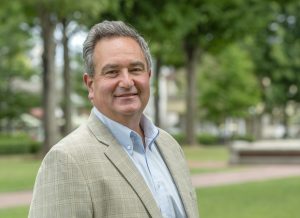
County Executive George Borrello has served Chautauqua County since 2009, first as an eight-year county legislator, then as county executive from 2017 onward.
Now, Borrello is looking to make the move to state government, running — and winning the Republican primary — for New York’s District 57 seat, after Republican Catharine Young stepped down in February.
Borrello was born and raised in northern Chautauqua County and graduated from Fredonia High School in 1985; he went on to attend Purdue University. Borrello spent his years after college building his business, Top-Shelf Marketing, a nationally recognized hospitality industry supplier.
While it took some convincing to announce his candidacy, he said that if elected, he will happily bring his non-partisanship and effective governing to the state legislature.
How did you get your start in politics and local government?
I was involved in politics when I was in high school and college. Even when I was still in high school and before I was old enough to vote, I worked on (former Chautauqua County Executive) Jack Glenzer’s county executive campaign — that was the first campaign I’d really worked on.
Also in college, I was president of the College Republicans at Purdue, where I went, and I got involved in politics; I went to George H.W. Bush’s inauguration in Washington, D.C., when I was a senior in college.
After that, I went into business and I let the politics drop off for a really long time. Then I got back involved in 2005. So after graduating from college in 1989, I didn’t get back involved in politics activity until 2005. Then I ran in 2009 for the county legislature, which was my first time running for office.
I became a county legislator in 2010 when I took office, and I really got focused on trying to get away from the partisan politics, at the time, of our county legislature. … We started off by doing something they said was impossible, which was downsizing the legislature. We went from 25 (legislators) to 19 in my second year as a county legislator, and I was one of the people that led that charge.
That was fuel to my fire. … I was a legislator for eight years and decided in early 2017 that I was going to run for county executive.
What is a county executive?
Out of the 62 counties in New York State, I believe there are only 18 county executives, so it’s a small group of people.
To summarize it, you’re the chief executive officer of county government, and in most areas it’s an appointed position, but here in Chautauqua County it’s an elected position. Being that I had been a chief executive officer of my own business prior, I had a little bit of experience on the business side of things, but you’re in charge of the operations of government, first and foremost.
It’s a nearly $250-million, year-annual budget with about 1,165 employees and a constituency of 130,000 people — so it’s a pretty big operation. If you put that in business terms, it’s a very big operation.
At the same time, the role of being the elected leader of the county in many ways involves making sure that we are focused on important things like economic development and the challenges that we face in a very diversified way. I deal with everything from how to combat the opioid crisis, to how to ensure we’re delivering services people need, to how do you keep Chautauqua Lake clean and usable.
On top of the regular, daily business of being the county executive and operating a very large operation, it’s also (up to) the leadership to address those issues, both long-term and short-term.
What is the county executive’s relationship to state government?
County government, in many ways, is an arm of state government, in the sense that we are the local taxing authority. (It is) so much of what we are really carrying out, the state mandates — anything from drivers’ licenses … to delivering the myriad of social services that are delivered through county government.
So the relationship to state government is sort of being at the bottom end of what state government forces upon local governments and the citizens.
What made you want to run for New York State Senate?
Initially, I said no. I enjoy being the county executive. I think we’re getting things accomplished, and I like how county government functions; we are an effective government that really does things in a pretty non-political way, so I like being where I am.
But then after having a lot more conversations with a lot of people, it became very apparent that without having a strong representative in the state Senate, so many of the initiatives and progress that we’re making here locally would be in jeopardy.
For me, the drive to want to be our next state senator came from ensuring that the progress that we’ve made, and the initiatives that we’ve started, get the strong advocacy in Albany that they need to continue.
What do you hope to accomplish if elected?
I hope that I could bring some of the common-sense way we do business here in Chautauqua County to Albany, because it’s certainly a very dysfunctional government operation in so many ways; it’s hyper-partisan.
We used to have that here once upon a time; when I first became a legislator, it was more about one side of the aisle trying to conspire against the other side of the aisle to get their agenda forward, and it wasn’t about serving the people. That’s kind of what we have in Albany now — we have a government that’s more focused on politics than people.
So I’m hoping that this perspective, on how to serve the people and work in the best interest of the people before politics, is something I hope I can bring to the operation of our state legislature.
New York State contains the nation’s largest metropolitan area and rural Upstate New York. How do you plan on bringing issues facing the rural areas to the legislature’s forefront?
There are people out there that say we need to separate New York City from the rest of the state, and I understand that sentiment and I appreciate that sentiment, but I don’t think that’s practical to think that way, at least in the short-term.
So we have to play the cards we’ve been dealt, and right now it’s you having to work with this Goliath, which is New York City. Not only is it a huge driver of policy in Albany, it is so diametrically opposed, most of the time, to the needs and desires and values of Upstate New York.
I also believe that we are part of a larger group of people up here in Upstate New York. When you really whittle it down, it’s not just Upstate vs. downstate, it’s about the values people hold, and I think so much of what you see going on in Albany right now is driven by a relatively small group of extreme people in Manhattan. Those values and those agendas and priorities don’t jive, even barely outside of Manhattan.
It’s happening because, I believe, there’s been a tremendous amount of intimidation that goes on. So for me, this is about holding other state legislators responsible for their actions that don’t support the values of their constituents.
How, if elected, would you help advocate for Chautauqua Institution’s initiatives?
I’ve been very fortunate to be involved in discussions on Chautauqua’s master plan and been able to give my input. I’ve worked very closely with President Michael E. Hill — I truly appreciate our friendship and partnership. I believe I’ve already been able to bring some local perspective to that initiative.
Also, even right now, we had a meeting recently where we involved the State Department of Transportation folks. We brought them in to talk with them about the master plan and some initial steps that work in concert with some of their plans. Doing that as county executive and bringing in my economic development team is good for everybody — it’s good for the Institution, it’s good for the local economy and it’s just good for our quality of life.
So I think being in a role of state senator will give me a larger influence in that. For me to know that there is a will from the board of trustees and the people of Chautauqua Institution to become more a part of the local community is very encouraging for me. Being able to step into this as state senator and facilitate more of those productive meetings and conversations and being able to move that process forward, I think, is something that would be very beneficial.
What are the largest challenges facing rural New York currently?
There’s a lot, but I think the main one is the loss of population that’s occurring throughout rural America. Go back a couple of generations — people wanted to leave the cities and move to the country and the suburbs and that happened for two, three generations. Now the opposite is happening: People are moving back to the cities.
There’s hope though, because now, with technology, people don’t have to show up at an office every day for work; more and more people are telecommuting. That’s an opportunity for us in rural areas; you can have the wonderful, active lifestyle of being able to live in a rural setting and still have a job and be connected to a high-tech job, for example.
It is important for us to develop a workforce for the jobs that are here. Right now we have lots of open positions here in Chautauqua County, and we need to start training or retraining those people that are displaced workers to be able to work in the jobs that are open, but also to show our kids that going into applied sciences, health care and skilled trades is a lucrative life.
If we can solve the workforce problem here, then it will not only fill the positions that are open and keep those businesses here and healthy and profitable, it will also help us attract new business. … If we can overcome the workforce issue, it will allow us to attract people despite the fact that we live in a highly burdened state when it comes to taxes and regulations.
What gets you out of bed in the morning?
Every day I wake up excited about going out and working with the people — not just people in county government. The motivation to make our area better gets me out of bed every day.




